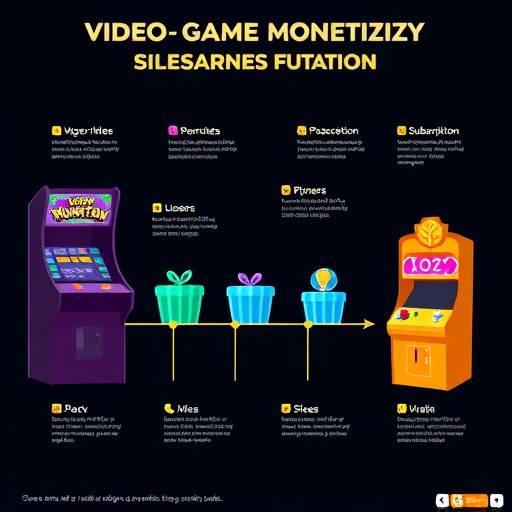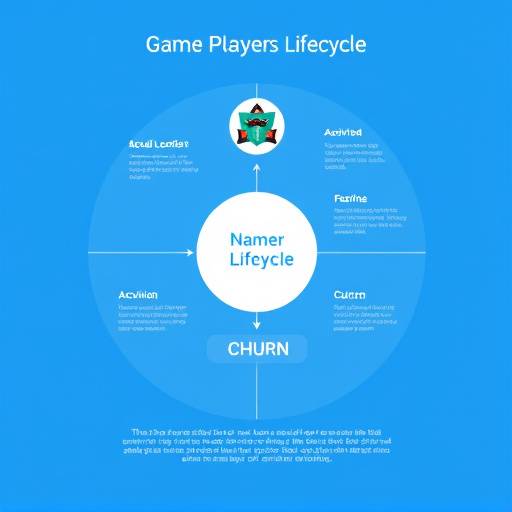Understanding the Attention Economy in Gaming
Delve into the fundamental principles that define how player attention shapes the modern gaming industry, from its historical roots to its contemporary implications.
Monetization Strategies Player Engagement TacticsThe Evolution of Gaming Value
The concept of value in the gaming industry has undergone a radical transformation. For decades, value was primarily derived from the tangible product itself – the game disc, the cartridge, or the download. Players paid a premium upfront for access. However, the advent of digital distribution, free-to-play models, and the proliferation of connected gaming experiences has fundamentally shifted this paradigm. Today, the most coveted resource is not a physical object, but an intangible, ephemeral, yet incredibly potent force: player attention.
At NexusPlay Insights, we are dedicated to dissecting this critical shift. Our mission is to provide a comprehensive understanding of the attention economy as it pertains to the gaming world. We aim to illuminate why player focus has become the ultimate currency, how game developers and publishers strategize to capture and retain it, and the profound economic and ethical consequences that arise from this ongoing pursuit.
This page serves as your foundational guide, exploring the historical trajectory and theoretical underpinnings of the attention economy in gaming. We will trace its origins, introduce key thinkers who have shaped our understanding, and explain the core principles that govern this dynamic field. By understanding these fundamentals, you can better grasp the strategies employed across the industry, from hyper-casual mobile games to expansive MMORPGs.

The gaming industry, with its inherently engaging and often immersive nature, is uniquely positioned to thrive within the attention economy. Games are designed to captivate, to draw players into worlds and experiences that demand their time and focus. This inherent appeal makes them a fertile ground for understanding how attention is acquired, maintained, and ultimately, converted into economic value. The constant need to innovate and differentiate in a crowded market means that mastering the art of capturing and holding player attention is no longer a competitive advantage; it is a prerequisite for survival and success.
Foundational Principles of the Attention Economy
The attention economy posits that in an information-rich world, human attention is the scarce resource. This principle, first articulated by Herbert Simon, suggests that we are suffering from an "informational over-abundance." In the context of gaming, this means that the challenge is not to create more content, but to make that content compelling enough to cut through the noise and capture the limited attention of players.
The Scarcity of Attention
Player attention is a finite resource. Individuals have a limited capacity to focus, process information, and engage with entertainment. Games must compete not only with other games but also with social media, streaming services, and everyday life for this precious commodity. Understanding this scarcity is the first step to effectively designing for engagement.
Information Overload
The digital age has resulted in an unprecedented volume of information and entertainment options. For gamers, this translates into an overwhelming array of choices. Developers must therefore employ strategies that make their games stand out, offering unique value propositions that compel players to choose their experience over countless others.
Value Creation Through Engagement
In the attention economy, engagement is currency. Games that successfully capture and hold player attention create value. This value can be realized through direct monetization, advertising revenue, community growth, brand loyalty, and the creation of intellectual property. The longer a player is engaged, the more opportunities there are to create and extract value.
The Role of Psychology
Understanding player psychology is crucial. Concepts like operant conditioning, loss aversion, scarcity, social proof, and the endowment effect are leveraged in game design to create compelling loops that encourage continued play. Gamification principles are employed to make even routine tasks feel rewarding, thereby extending player engagement.
Key Theorists and Concepts
Several influential thinkers have contributed to our understanding of the attention economy. While the term itself is often attributed to Herbert Simon, its application to digital media and gaming has been further shaped by contemporary analysts and researchers.
Pioneering Insights
Herbert Simon , a Nobel laureate in Economics, first highlighted attention as a scarce resource in the information age. He observed that "a wealth of information creates a poverty of attention." This foundational idea underscores the challenge for any content creator, especially in the gaming industry, to make their offerings stand out.
Contemporary Voices
More recently, figures like Cal Newport , author of "Deep Work" and "Digital Minimalism," have explored the societal impact of constant digital distraction and advocated for strategies to reclaim focused attention. While not solely focused on gaming, his work provides critical insights into the psychological mechanisms that games can exploit or, conversely, help players resist.
At NexusPlay Insights, we draw upon these theories to analyze the specific mechanics within games. We examine how features like daily rewards, limited-time events, achievement systems, and competitive leaderboards are designed to tap into fundamental human desires for progress, recognition, and social validation, all of which serve to capture and retain player attention.

The lifecycle of player attention within a game is a complex journey. It begins with initial acquisition, often driven by marketing or word-of-mouth. This is followed by the engagement phase, where players actively interact with the game's core mechanics. Successful games then move into retention, where players develop habits and routines that bring them back repeatedly. However, attention is never guaranteed; players can and do churn, moving on to other pursuits. Understanding each stage of this lifecycle is paramount for developers aiming to build sustainable and profitable games.
Ethical Considerations in Capturing Attention
While the attention economy offers significant opportunities for the gaming industry, it also presents substantial ethical challenges. The pursuit of player attention can sometimes lead to practices that may be detrimental to player well-being, financial stability, or overall autonomy.
The Fine Line Between Engagement and Exploitation
One of the most pressing concerns is the potential for game designs to become manipulative. When game mechanics are designed to exploit psychological vulnerabilities – such as encouraging excessive spending through artificial scarcity, creating addictive reward loops that resemble gambling, or leveraging fear of missing out (FOMO) through time-limited offers – the ethical boundaries are blurred.
At NexusPlay Insights, we believe in fostering a dialogue about responsible game design. This includes:
- Transparency: Clearly communicating game mechanics, monetization strategies, and data usage policies to players.
- Player Agency: Ensuring players have meaningful choices and control over their gameplay and spending.
- Avoiding Predatory Design: Refraining from employing tactics that target vulnerable individuals or encourage unhealthy gaming habits.
- Promoting Well-being: Designing games that contribute positively to players' lives, fostering creativity, social connection, and skill development, rather than simply consuming their time and money.
Our Commitment to Responsible Insights
Our platform, NexusPlay Insights, is founded on the principle of providing actionable knowledge that promotes both business success and ethical integrity. We aim to empower creators and stakeholders with the understanding needed to navigate the attention economy responsibly. We actively research and share best practices that prioritize player trust and long-term value creation over short-term gains.
For more detailed information on our operational principles and how we uphold player privacy and trust, please refer to our dedicated policies. Zenith Interactive Solutions, our parent company, is committed to leading by example in this evolving digital landscape.